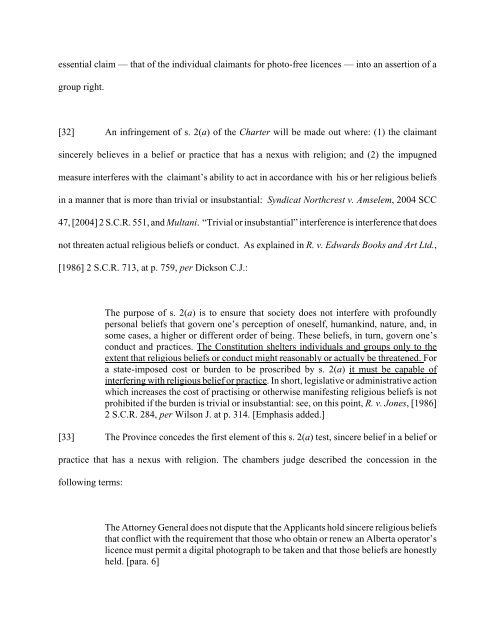SUPREME COURT OF CANADA CITATION: Alberta v. Hutterian ...
SUPREME COURT OF CANADA CITATION: Alberta v. Hutterian ...
SUPREME COURT OF CANADA CITATION: Alberta v. Hutterian ...
Create successful ePaper yourself
Turn your PDF publications into a flip-book with our unique Google optimized e-Paper software.
essential claim — that of the individual claimants for photo-free licences — into an assertion of agroup right.[32] An infringement of s. 2(a) of the Charter will be made out where: (1) the claimantsincerely believes in a belief or practice that has a nexus with religion; and (2) the impugnedmeasure interferes with the claimant’s ability to act in accordance with his or her religious beliefsin a manner that is more than trivial or insubstantial: Syndicat Northcrest v. Amselem, 2004 SCC47, [2004] 2 S.C.R. 551, and Multani. “Trivial or insubstantial” interference is interference that doesnot threaten actual religious beliefs or conduct. As explained in R. v. Edwards Books and Art Ltd.,[1986] 2 S.C.R. 713, at p. 759, per Dickson C.J.:The purpose of s. 2(a) is to ensure that society does not interfere with profoundlypersonal beliefs that govern one’s perception of oneself, humankind, nature, and, insome cases, a higher or different order of being. These beliefs, in turn, govern one’sconduct and practices. The Constitution shelters individuals and groups only to theextent that religious beliefs or conduct might reasonably or actually be threatened. Fora state-imposed cost or burden to be proscribed by s. 2(a) it must be capable ofinterfering with religious belief or practice. In short, legislative or administrative actionwhich increases the cost of practising or otherwise manifesting religious beliefs is notprohibited if the burden is trivial or insubstantial: see, on this point, R. v. Jones, [1986]2 S.C.R. 284, per Wilson J. at p. 314. [Emphasis added.][33] The Province concedes the first element of this s. 2(a) test, sincere belief in a belief orpractice that has a nexus with religion. The chambers judge described the concession in thefollowing terms:The Attorney General does not dispute that the Applicants hold sincere religious beliefsthat conflict with the requirement that those who obtain or renew an <strong>Alberta</strong> operator’slicence must permit a digital photograph to be taken and that those beliefs are honestlyheld. [para. 6]
















